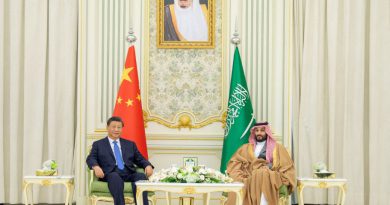Israeli finance minister suspends funds to Arab towns, East Jerusalem
Jerusalem (Reuters) – Israeli Finance Minister Bezalel Smotrich has frozen funds for Arab towns and Palestinian education programmes in East Jerusalem, citing crime and safety fears and prompting accusations of racism.
Smotrich, a key member of Prime Minister Benjamin Netanyahu’s nationalist-religious government, said on Monday some of the budget funds meant for Arab local councils were a political pay-off by the previous cabinet that could end up in the hands of “criminals and terrorists”.
“The priorities of our national government… are different from those of the previous leftist government and we should not apologise for that,” said Smotrich, head of the pro-settler Religious Zionism party whose past comments about the Palestinians have drawn international condemnation.
Israel’s public broadcaster Kan first reported the freeze on Sunday when it published a letter from Interior Minister Moshe Arbel to Smotrich, urging him to release 200 million shekels ($54 million) of the funds at stake that are intended for administration and another 100 million for economic development.
Lawmaker Mansour Abbas who heads the United Arab List accused Smotrich of racism.
“Arab citizens are entitled to those funds, which were meant to close the gaps between Arab and Jewish communities,” he told Reuters.
Arab citizens, most of whom are descendants of Palestinians who stayed in the new Israeli state after the 1948 war surrounding its creation, make up about a fifth of Israel’s population.
Netanyahu’s office did not respond to a request for comment, while opposition leader and former prime minister Yair Lapid also accused Smotrich of racism, “abusing Arab citizens simply because they are Arab”.
Israel’s Arab minority has for decades faced social and economic disparities compared with Jewish citizens, including high poverty rates, overcrowded towns lacking in infrastructure and poorly-funded schools.
The extra funds, designated in 2022 for 67 Arab councils, were the state’s acknowledgement of years of insufficient resource allocation to Arab localities, said Ameer Bisharat, head of the National Committee of Arab Local Councils in Israel.
The freeze could mean that councils are unable to provide basic services such as garbage collection or reopening schools after the summer holiday, he said.
‘Hatred And Racism’
Smotrich said a separate 200 million shekels for encouraging academic studies among Palestinians from East Jerusalem would also be frozen until what he described as “extremist Islamic activity” on campus was eradicated.
In May, the government extended a 2018 2.1 billion shekel five-year plan meant to improve education, employment, health and infrastructure in East Jerusalem, which Israel captured in a 1967 war and annexed in a move unrecognised internationally.
It includes programmes to help Palestinians – who make up almost 40% of Jerusalem’s population, with almost two thirds below the poverty line – integrate into Israeli academic institutions.
Smotrich said the new East Jerusalem plan would have a total increased budget but that although encouraging academic studies among the city’s Palestinians was a worthy cause, this also had unwelcome consequences.
“In recent years, radical Islamic cells have developed in Israeli universities and colleges, over and over again they express solidarity with Israel’s enemies,” he said on Facebook, responding to Kan’s report.
It was unclear on what data or research Smotrich had based his radicalisation claim, though he cited pro-Palestinian student protests during the 2021 Israel-Gaza war. The academic institutions involved rejected his claim.
The Hebrew University of Jerusalem, along with three other institutions, expressed shock at Smotrich’s funding decision, which will affect hundreds of Palestinian students, and urged Netanyahu not to let “voices that promote hatred and racism” prevail.
Security chiefs have made clear that Smotrich’s decision will be counterproductive, the university added.



